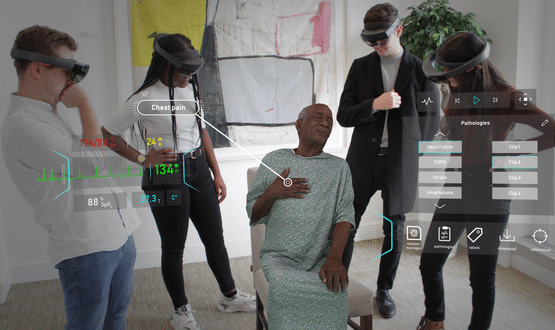The University of Cambridge and Cambridge University Hospitals (CUH) NHS Trust have partnered up with GigXR to create interactive holographic simulation training for medical professionals and learners.
Using mixed reality, which combines physical environments with hyper-realistic digital elements, learners will be able to interact with holographic patients to practice high-level, real-time decision making and intervention choice.
GigXR, a global provider of eXtended Reality (XR) solutions for instructor-led teaching and training, will offer the technology through their Immersive Learning Platform, where the partnership and new holographic simulations can be accessed and deployed.
David King Lassman, CEO of GigXR, said: “Cambridge has forged an industry-leading path in the integration of mixed reality, medicine and the learning sciences. We are honoured to be working with this world-class university, hospital trust and research team.
“Capitalizing on a tradition of innovation that has already included landmark work on DNA and the discovery of monoclonal antibodies, the University of Cambridge continues to create programs and tools for tomorrow’s healthcare leaders.”
The GigXR technology will enable educators to access and share scenarios, change patient vitals, introduce complications and record observations and discussions, while projecting the holographic media using Microsoft’s HoloLens mixed reality headset in any physical training environment.
Dr Arun Gupta, director of postgraduate education at Cambridge University Health Partners, said: “In healthcare in days gone by, people used to gain most of their training at night on patients in wards or in operating theatres.
“What we try to do with healthcare professionals is bring up their competency level before actually doing anything with patients, so that no harm comes to them.
“To do that we need to make sure that the training is as realistic as possible so that when it comes to the patient it’s not new to them. Over the years, simulation and technology has improved to increase that realistic feel of it.”
Patient-based holographic simulation scenarios have been found to result in better learning than manikin-based simulation.
The new technology created by GigXR and Cambridge allows learners to grab a holographic stethoscope and listen to the holographic patient’s lungs to assess and treat conditions like COPD or pneumonia, meaning they can learn invaluable skills without any potential risk to patients.
CUH NHS Trust’s partnership with GigXR is their latest adventure since they signed a five-year non-exclusive Strategic Research Agreement with Sensyne Health last month.
The agreement will give Sensyne Health access to three million de-identified patient records from CUH which will be used for clinical AI research, aiming to help improve patient outcomes.
Dr Gupta added: “As a team what we’re very keen to do is to advance education and training for healthcare workers as best we can.
“What I’m proud of is bringing together such a vibrant group of enthusiasts of academics, intellects, technologists and clinicians who are pulling in the same direction to get the same objective of improving how we educate our healthcare staff and improve outcomes in patients.”

